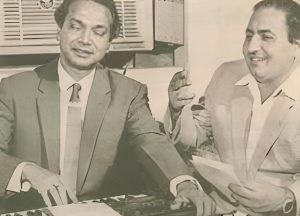 In the intricate tapestry of Bollywood’s musical heritage, Vintage Hindi melodies have left an indelible imprint on the pages of time, enchanting audiences for generations. Their immortality can be attributed to a unique blend of unwavering dedication from the core team – the Lyricist, Music Composer, and Singers – and a commitment to the rules of Ragas by the Music Director.
In the intricate tapestry of Bollywood’s musical heritage, Vintage Hindi melodies have left an indelible imprint on the pages of time, enchanting audiences for generations. Their immortality can be attributed to a unique blend of unwavering dedication from the core team – the Lyricist, Music Composer, and Singers – and a commitment to the rules of Ragas by the Music Director.
This seamless blend of talent and tradition creates musical masterpieces that resonate profoundly with listeners, leaving a lasting impression on their hearts and spirits. It is this enchanting synergy that ensures the classics of the Golden Era persistently reverberate through the corridors of time.
A shining example of this timeless magic is the 1952 classic Baiju Bawra, specifically the soul-stirring composition Man Tarpat Hari Darshan Ko Aaj …. crafted for a poignant moment. Here, Baiju longs to see his guru, hindered by illness, while the guru, Swami Haridas, struggles to reach the temple to catch a glimpse of his beloved Lord Krishna. The song becomes a vessel for Baiju’s intense emotions, articulating his yearning to behold his lord.
What renders this devotional gem even more extraordinary is the diverse composition team behind it – all members were of the Muslim faith. Penned by Shakeel Badayuni, composed by Naushad Ali, and delivered with divine resonance by the legendary Mohammad Rafi, this song stands as a testament to the secular character of the film industry and the unity in diversity of India.
Curiously, the initial choice for this profound rendition was the illustrious Talat Mehmood. However, destiny took an unexpected turn when Naushad Ali, the composer, witnessed Talat Mehmood smoking inside the studio — an act perceived as disrespectful to the sanctity of music. Instantly offended, Naushad replaced Talat Mehmood with Mohammad Rafi, marking a pivotal shift in events.
The day before the scheduled recording, Naushad Ali insisted that the entire team perform their ablutions, emphasizing the need for a cleansed body and a pure mind. Malkauns, a solemn and contemplative Raag predominantly in Mandra Saptak and composed in Vilambit laya, was chosen as the foundation for this divine composition.
During the recording, it is said that Mohammad Rafi immersed himself so profoundly in the song that everyone present was left in awe. Observing the enchantment unfold, even Lallu bhai, the unit staff responsible for disbursing payments, found himself chanting “Krishna Krishna” and wandering through the studio in a trance.
Mohammad Rafi’s unwavering dedication to this song created a masterpiece with unparalleled match till date. The transcendence of his performance was so profound that even he deemed it impossible to recreate the divine magic.
With the release of Baiju Bawra, Mohammad Rafi soared to a prominent position in the playback universe, cementing his legacy as one of the greatest voices in the annals of Hindi Cinema.
Our next article will explore how a Singing Maestro can exhibit his brilliance despite limited verses in a song.
